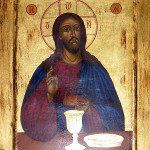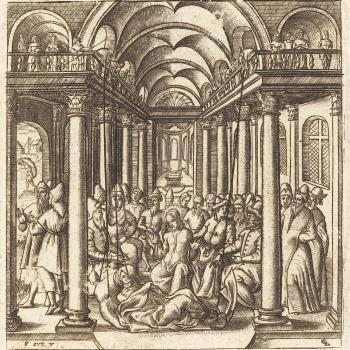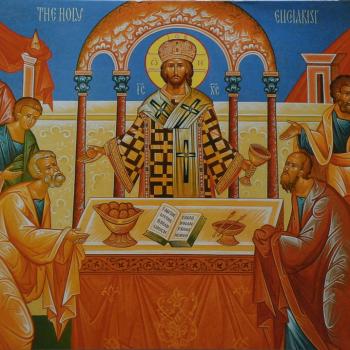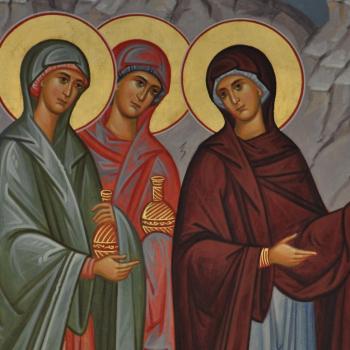![Ceiling Mosaic - Christus helios, the mosaic of Sol in Mausoleum M, which is interpreted as Christ-Sol (Christ as the Sun). Detail of vault mosaic in the Mausoleum of the Julii. From the necropolis under St. Peter's Mid-3rd century Grotte Vaticane, Rome By User:Leinad-Z ([1]) [Public domain], via Wikimedia Commons](https://wp-media.patheos.com/blogs/sites/637/2016/08/ChristAsSol-281x300.jpg)
By User:Leinad-Z ([1]) [Public domain], via Wikimedia Commons
The self-righteous, because they have yet to understand their spiritual sickness, will turn Jesus away as they strive for perfection on their own. They think they can do it with their own power. They are self-centered, full of hubris, not understanding that however good they are on their own, their power, their righteousness is limited; it will come to an end. They are sick and weak and will need the help of God. This was the fundamental point of St. Augustine’s criticism of Pelagianism: we need grace because it alone provides what we lack and allows us to attain the state of being we would like for eternity.
Paul realized this and so saw that not only can we be saved through grace, but we must recognize and realize our own personal weakness and accept it so that in that acceptance, we truly make room for God to save us. Often, we need some sort of sign, some sort of weakness in ourselves, to stir us away from pride and so to prevent us from any attempts of self-validation without God, which for Paul, was his “thorn in the flesh”:
And to keep me from being too elated by the abundance of revelations, a thorn was given me in the flesh, a messenger of Satan, to harass me, to keep me from being too elated. Three times I besought the Lord about this, that it should leave me; but he said to me, “My grace is sufficient for you, for my power is made perfect in weakness.” I will all the more gladly boast of my weaknesses, that the power of Christ may rest upon me. For the sake of Christ, then, I am content with weaknesses, insults, hardships, persecutions, and calamities; for when I am weak, then I am strong (2 Cor. 12:7-10 RSV).
What Paul tells us is that it is in our weakness we find God, and so, paradoxically, in our weakness we become strong. For only in accepting our weakness, realizing it is in part the result of our sinfulness, can we put an end to our pride. It is then we put a stop to trying to do it all by ourselves, in and through our own self-power. We must open ourselves up to the love which God has in store for us and let it fill us up and make us strong. In accepting our weakness, we allow the other power of his grace to take effect, not only to heal us, but to lift is up and allow us to come into union with Christ. As we become one with him, Christ lives in us and we in him, so that there becomes a lack of real duality between the two of us. In him, we find we can say “I can do all things in him who strengthens me” (Philip. 4:13 RSV). For we find ourselves transcending ourselves thanks to the fullness of God which is rendered to us through God’s love:
For this reason I bow my knees before the Father, from whom every family in heaven and on earth is named, that according to the riches of his glory he may grant you to be strengthened with might through his Spirit in the inner man, and that Christ may dwell in your hearts through faith; that you, being rooted and grounded in love, may have power to comprehend with all the saints what is the breadth and length and height and depth, and to know the love of Christ which surpasses knowledge, that you may be filled with all the fulness of God (Eph. 3:14-19 RSV).
What God offers us, the love which he provides to us, a love which he demonstrates to us in and through Christ on the Christ should elicit a loving response from us in return, one which acknowledges in wonder what he has done for us. It is, after all, his initiative which transforms us and even gives us the opportunity to free ourselves from our self-attachment; without the prevenient grace which he gives to all, none should find themselves able to overcome their self-obsession and so would end up trapped within the limits of their own self-power. Paul, therefore, explained: “While we were still weak, at the right time Christ died for the ungodly” (Rom. 5:6 RSV).
Now in and through his power, in and through the grace which comes to us, we are drawn to him, indeed, we come to see and know him in the light of love, and so respond in kind with our love. “Kyrie Eleison!” “Lord, have mercy!” “ Lord Jesus Christ, Son of God, have mercy upon me a sinner!” We can and should say these words not out of fear, but out of love; we are sorrowful for our own unlove before God and yet we realize that the power of love comes into us, flows through us, lifts us up and draws us in so that we no longer find ourselves self-attached to our unloving ways but transformed to reflect such love back to God. We say with joy such prayers which not only ask for the continuation of his grace, but prayers which reminds us of what God is doing in and with us even as we speak them. God is being merciful, God is coming to us in our weakness and saving us from ourselves and our self-power. It is love which makes these words effective and truly our prayer to God, for it is only through love do we cut out our self-attachment and any claims to self-power and open ourselves to God our beloved and receive from him his love as our saving grace. The power of Christ, the power of love, makes it possible for us to open up outside of ourselves and be lifted up to partake of the divine nature for ourselves: “Let us then with confidence draw near to the throne of grace, that we may receive mercy and find grace to help in time of need” (Heb. 4:16 RSV). When our heart cries out with love in and through continuous prayer to God, we speak and receive the mercy of love at the same time, rejoicing in the love as we declare it in its reception.
In our weakness, we find glory. In our weakness, we find God there working in and for us; but we must then accept that work, that power of God, the power of love, in us; we must cooperate with it. When we do so we truly find ourselves transcending ourselves and united with God, and in our weakness, truly become strong, filled with the other-power of God’s love which transcends all the would-be power and glory found in the world.
Stay in touch! Like A Little Bit of Nothing on Facebook:
A Little Bit of Nothing

















